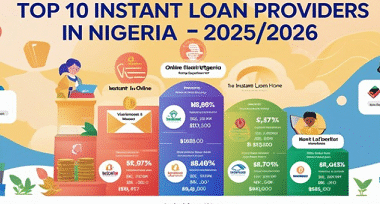Business Loans for Startups with No Revenue in Nigeria 2025/2026
Introduction
One of the most significant challenges Nigerian entrepreneurs face is securing financing to launch or grow their startups especially when they have no existing revenue. Most banks and financial institutions prefer lending to businesses with cash flow or collateral, making it hard for early-stage founders to access credit.
However, thanks to the growth of fintech, government initiatives, and private investment funds, there are now multiple options for startups to get business loans without any revenue. Whether you’re launching a tech startup, small logistics company, or food processing venture, there are funding sources tailored to help you move forward.
This comprehensive article explores the top 10 loan options for startups without revenue in Nigeria, including platforms, government programs, angel funds, and microfinance banks.
Can You Get a Business Loan Without Revenue?
Yes, it is possible though not easy. Startups with no revenue must rely on alternative forms of loan approval. Lenders may consider:
-
A well-documented business plan
-
Your personal credit history or BVN profile
-
Startup accelerator participation
-
Cash flow projections
-
Business registration with CAC
-
Industry potential (e.g., tech, agriculture, renewable energy)
Best Business Loan Options for Startups with No Revenue in Nigeria
1. Tony Elumelu Foundation Entrepreneurship Programme (TEF)
Type: Non-interest loan + grant
Amount: Up to $5,000 (≈₦7,000,000)
Eligibility: African entrepreneurs with a feasible business idea or early-stage business (0–3 years old)
Repayment: Partial loan, part grant after training and mentorship
Application: Annual (usually Q1 every year)
Why Choose TEF?
It offers funding, training, and a vast network across Africa. No prior revenue or traction is required—just a compelling business idea.
2. Bank of Industry (BOI) Youth Entrepreneurship Support (YES) Programme
Type: Government-backed business loan
Amount: ₦500,000 – ₦5,000,000
Tenure: 3 – 5 years
Interest Rate: 9% per annum
Eligibility: Must be a Nigerian aged 18–35, with a business idea and CAC registration
Collateral: Not always required; based on type of business
Best For: Manufacturing, agriculture, fashion, and ICT startups
3. Development Bank of Nigeria (DBN) Loan Scheme
Type: Term loan through partner banks and MFIs
Amount: ₦500,000 – ₦10 million
Tenure: Up to 10 years
Interest Rate: Single digit (varies by lender)
Revenue Requirement: Flexible—projections accepted
Where to Apply: Through partner MFIs like LAPO, NIRSAL, and commercial banks
Note: The DBN does not lend directly but guarantees startup-friendly terms through its partners.
4. LAPO Microfinance Bank SME Loans
Type: Microfinance business loan
Amount: ₦50,000 – ₦5 million
Collateral: No traditional collateral, but group guarantees or personal references
Tenure: 6 – 18 months
Best For: Traders, women-led startups, small-scale production businesses
Why LAPO?
They are startup-friendly and widely accessible, even in rural Nigeria.
5. SMEDAN Conditional Grant Scheme
Agency: Small and Medium Enterprises Development Agency of Nigeria
Support: Free grants and business support services for MSMEs
Target: Nano and micro businesses
Revenue Requirement: Not required; must be registered and operational
How to Apply: Visit SMEDAN’s official portal (updates are usually released via NTA or SMEDAN website)
Note: This is not a loan but a grant that can serve as seed capital.
6. Moniepoint Business Loan
Type: Digital business loan (fintech)
Amount: ₦100,000 – ₦2 million
Eligibility: Register as a Moniepoint POS agent or SME
Collateral: None
Tenure: 1 – 6 months
Revenue Requirement: Flexible; daily transaction data used instead
Why Choose Moniepoint?
It works well for early-stage retail startups or small traders with little or no financial history.
Business Loans for Startups with No Revenue in Nigeria 2025/2026
7. NIRSAL Microfinance Bank AGSMEIS Loan
Type: CBN-backed loan under the Agric, Small and Medium Enterprise Scheme
Amount: Up to ₦10 million
Interest Rate: 5% per annum (for first 5 years)
Tenure: Up to 7 years
Revenue: Not required; business plan and training needed
Requirements: Attend a certified entrepreneurship training program
Best For: Startups in agric-tech, poultry, fish farming, or food processing
8. StartCred Loan (for Pre-Revenue Startups)
Type: Private digital startup funder
Amount: ₦50,000 – ₦1 million
Platform: StartCred.com.ng
Eligibility: Business plan + registration + BVN
Tenure: 3–12 months
Interest Rate: 3% – 5% monthly
Why Use StartCred?
They support unbanked founders, youth, and artisans.
9. Family and Friends Business Loans
Type: Informal loan
Amount: ₦10,000 – ₦5 million depending on network
Tenure: Flexible, mostly informal
Interest Rate: 0% – negotiable
How to Leverage This:
Create a formal promissory note and repayment schedule. Combine with other sources.
10. Angel Investors / VC Seed Rounds
Type: Equity-based early-stage funding
Amount: $10,000 – $150,000
Eligibility: Startups with MVP or pitch deck
Revenue: Not required, but business idea must be scalable
Top Platforms:
-
Lagos Angel Network (LAN)
-
Risevest Founder’s Fund
-
Future Africa
-
GreenHouse Capital
Why It Matters:
Many of these investors offer convertible loans or SAFE (Simple Agreement for Future Equity) funding options with low initial pressure.
Additional Alternatives for Startup Financing
-
Crowdfunding (NaijaFund, StartCrunch)
Pitch your startup idea to the public and raise small contributions. -
Startup Accelerators (CcHub, Founders Institute, Startupbootcamp)
Some offer seed capital and mentorship for equity or grants. -
Bootstrapping
Use personal savings, freelancing, or small side hustles to fund your startup gradually.
What Documents Do You Need for Startup Loans?
Even without revenue, you must prepare:
-
Business plan or feasibility study
-
Valid means of ID
-
Bank Verification Number (BVN)
-
Corporate Affairs Commission (CAC) registration
-
Utility bill or proof of address
-
Cash flow projection (for 6–12 months)
Optional but helpful:
-
Pitch deck
-
Letter of intent from prospective clients
-
Training certification (SMEDAN, BOI, NIRSAL, etc.)
Business Loans for Startups with No Revenue in Nigeria 2025/2026
Challenges of Getting Loans Without Revenue
While possible, here are common hurdles:
-
High interest rates (especially from fintech lenders)
-
Limited access to formal credit without CAC or BVN
-
Short repayment cycles (as low as 3 months)
-
Lack of mentorship or support structures
Hence, it’s advisable to combine loans with mentorship or funding from programs like TEF or SMEDAN.
Success Tips for Pre-Revenue Startup Loan Approval
-
Register your business with CAC
-
Create a compelling business plan with financial forecasts
-
Build personal and business creditworthiness (no loan defaults)
-
Leverage your network: referrals, group support, or cooperative societies
-
Be realistic in your projections and borrowing amount
-
Apply to multiple sources, not just one lender
Testimonials from Startup Founders
Damilola A. – Agritech Startup (Ibadan)
“I got ₦3.5 million from BOI’s YES programme. I had no sales at the time, just a strong plan. The key was training and being ready for questions.”
Ruth E. – Fashion Business (Abuja)
“LAPO gave me ₦250,000 to scale my clothing line. I had zero revenue but a CAC and good references.”
Chijioke I. – Logistics Startup (Lagos)
“I started with a ₦1 million Moniepoint loan and scaled operations. I used my POS data as proof of activity.”
Frequently Asked Questions (FAQs)
Q1: Can a startup without CAC get a loan?
A: Some fintechs may approve loans, but formal lenders and government programs require CAC.
Q2: What is the minimum amount I can borrow?
A: As low as ₦10,000 from fintechs like StartCred or Palmcredit.
Q3: Do I need a guarantor?
A: Not for most fintechs, but some microfinance banks or government schemes may require one.
Q4: How do I improve my chances?
A: Write a clear business plan, register your business, and apply to multiple platforms.
Conclusion
Securing a business loan as a startup with no revenue may seem daunting, but with the right knowledge, documentation, and strategy, it is entirely possible. Whether you choose government-backed options like BOI and NIRSAL, private digital lenders like Moniepoint and LAPO, or angel investors, there are clear paths to funding your dream.
Start with what you have refine your idea, prepare your pitch, and apply to as many relevant sources as possible. Always borrow responsibly, and don’t rely solely on loans to validate your startup’s worth. Strategic planning, consistency, and financial discipline will take you far.




